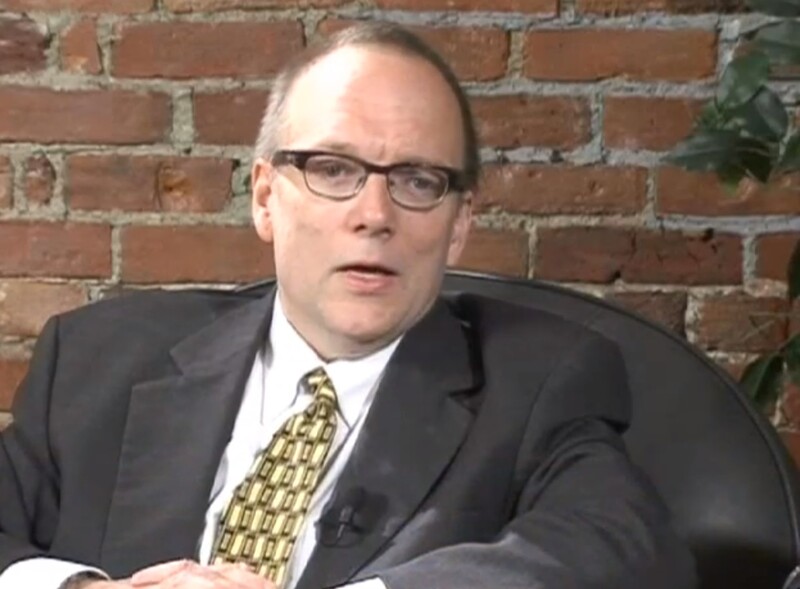Lobby Watch 24 June 2014

Dexter Van Zile in a screenshot from an interview on “Pray TV.”
The Committee for Accuracy in Middle East Reporting in America (CAMERA) is known as one of the more vocal, and well-funded, Israel lobby organizations. Its employees harangue journalists and human rights defenders in the name of “promoting accurate and balanced coverage of Israel and the Middle East.”
Dexter Van Zile is CAMERA’s “Christian media analyst” and a regular author of the website’s blog posts and articles. Prior to working for Israel advocacy groups, Van Zile spent years writing about the commercial fishing industry. So how did, in his own words, “a rinky-dink freelance journalist” become a CAMERA “expert”?
Van Zile traces the start of his journey towards professional Israel advocacy with a 2004 article he wrote for a now-defunct website, where he attacked the United Church of Christ’s apparent silence on bloodshed in Sudan. Van Zile claimed that the massacres in Sudan “undermine confidence in the notion that Islam is a religion of peace.” Confronting violence “in Sudan and elsewhere,” Van Zile wrote, would “require asking some serious questions about the nature of Islam.”
According to Van Zile, this “long screed” got him noticed by Charles Jacobs, founder of The David Project, a Zionist group focused on American universities. In 1988, Jacobs co-founded the Boston branch of CAMERA, which later became the organization’s national office. Jacobs’ track record includes concern for the “Islamist penetration of American society” and describing mosques as “victory markers.” He was a leading figure in a campaign against a new mosque in Boston, a controversy CAMERA sought to distance itself from — in a post by Van Zile.
After Jacobs’ approach to Van Zile, the fishing journalist was hired by The David Project in 2005 as “director of Christian outreach” — to fight efforts aimed at convincing Protestant churches to divestment from firms that profit from Israel’s occupation. In that role, Van Zile also oversaw an initiative called the Judeo-Christian Alliance. A year later, he moved to CAMERA.
Imagining threats
From his 2004 article asking about “the nature of Islam” onwards, it becomes clear that Van Zile’s views on Islam have shaped his approach to Israel advocacy. In 2012, he told a meeting organized by New Hampshire 4 Israel:
If you make a plain text reading of the Quran, and you look at the behavior of Muhammad and his early companions, and then you look at the behavior of al-Qaeda, what you see is a lot more of isomorphism. There’s a lot more similarity between the modern day extremist groups and the founders of the Muslim faith.
Van Zile made a similar comparison in 2010, describing violent extremists as “much more similar to what Muhammad and his earlier followers engaged in, during the founding of Islam.”
At another event in 2012, a meeting attended by an Israeli diplomat which heard calls for an end to “pro-Islam bias in grade school textbooks,” Van Zile told the audience that they were facing “a very sophisticated group of people who seek to undermine the West” and are “using our schools, our churches, our newspapers, our television stations” to do so. He went on:
For the past many centuries, fourteen centuries, essentially Islam has offered up a very persistent message of dominance and intolerance towards the infidels, non-Muslims. And this has had a huge impact on the Arab-Israeli conflict, it’s one of the important aspects of the conflict.
CAMERA’s analyst, then, sees the Middle East through the prism of what he has called “the threats facing Western civilization,” as quoted by Melanie Phillips in her 2012 book The World Turned Upside Down. This is also relevant to Van Zile’s attacks on Christian Palestinian activism: in May 2013, he told pro-Israel activist David Kaufman that an apparent “persistent strain of hostility” towards Christians in Palestinian society is “rooted in traditional Islam.”
Unsurprisingly, Van Zile has been influenced by, and cites, figures popular among the Islamophobic right, including Andrew Bostom, Raymond Ibrahim — who Van Zile considers an “expert on Islamist ideology” — and Richard Rubenstein, who believes that “a version of Islam” constitutes “an irreconcilable menace” to Western civilization.
Van Zile has also praised the work of Bat Ye’or, and Australian church minister Mark Durie, both for their work on the so-called dhimmitude of non-Muslims under Muslim rule. According to Durie, “If you adopt the posture of praising Islam, you are already acting like a threatened or defeated person.” Van Zile has clearly absorbed the work of such folk, describing the “habits of mind” of dhimmis (non-Muslims in Islamic countries) as being like “a curse.”
In a 2006 interview, Van Zile reminisced about his university days in the mid-1980s, and how he would attack the school’s president in the campus newspaper. “Most of the calumny I subjected him to was undeserved.” Van Zile commented, “but I was easily bored, had space to fill and he was a convenient target.” Plus ça change.
That CAMERA would depend for analysis on a “fundamentally polemical, ideological guy” with a self-declared “impulse as a crusader” speaks volumes. It would appear that to go from writing about commercial fishing to working for leading Israel lobby organizations, all you need to do is just ask some questions about “the nature of Islam.”






Comments
Fishing reporter?
Permalink Joe replied on
Instead of launching ad hominem attacks on a former "fishing reporter", how about dealing with the arguments for a change? Anyone can acquire knowledge about a new subject matter by studying it.